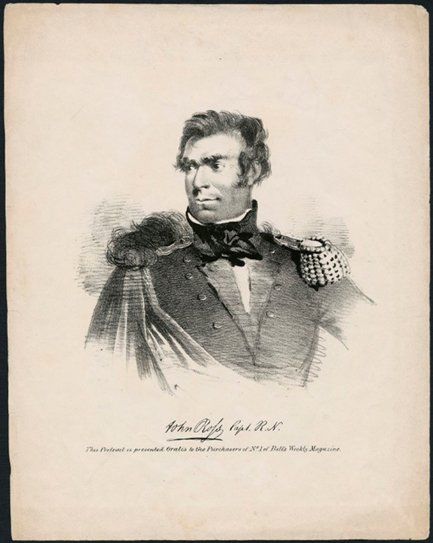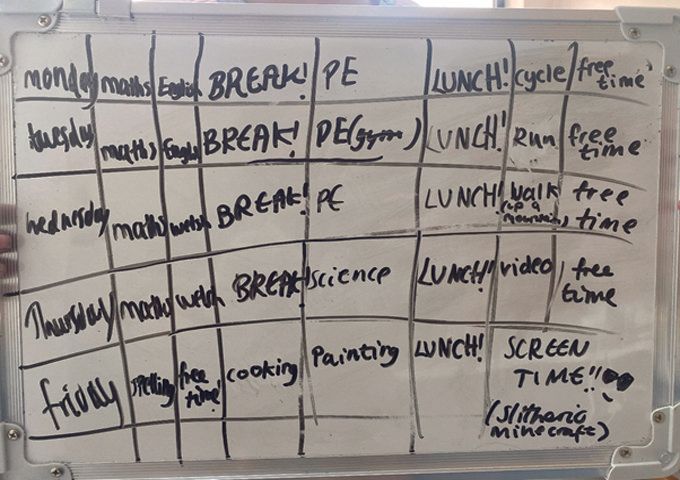The importance of Routine
In the last few days, the advice from the Government has gone from social isolation, to the closing of schools, restaurants, cafes and gyms and as of yesterday the advice to stay in. As a result there has been a significant change in the usual daily routine for just about everyone and now seems to be a good time to talk about how to cope.
In the absence of your normal routine you will automatically start a new one and, for most people, this may not be a voluntary choice it may well be one that you just ‘fall into’. For some people it may be positive, for others it may not. The most important thing you can do now is to establish your own routine and be in control of it rather than just to fall into one that is random and unstructured. There are good reasons for establishing these routines and to illustrate them let’s first take a trip back in history…
In 1829 John Ross set sail in the small steam ship The Victory, in search of the Northwest Passage. This was the fabled route around Northern Canada that in theory would lead to the far east and shorten the long and dangerous trade routes around Southern Africa and Southern America. Unbeknown to John Ross, there is no such passage, as the area is an impenetrable maze of islands and ice. However, in its day it was the Holy Grail of Victorian exploration and many tried, unsuccessfully, to find the illusive route. Ross left London in May and by September the expedition had become hopelessly encased in sea ice. They would spend a further 4 winters in the Arctic before their eventual rescue.
As with many expeditions at the time, they had very little experience of what was to happen to them. Once it became apparent to Ross they were stuck fast, he had to quickly come to terms with how to deal with the men in his command and how to keep them both sane and safe. Rather unsurprisingly, being a product of the Victorian military, the answer for him lay in the discipline of routine!
Despite being ice bound, Ross ensured that the ship’s routine would go on undisturbed. Watches would be kept, the men would rise early as always, clean the decks and perform all the usual endless and exhausting duties required on ships. The ship’s log was maintained, so they always knew exactly what day and date it was. This allowed Sunday’s religious services to be maintained and Easter and Christmas to be celebrated. In what must have harsh and terrifying circumstances Ross understood the way to keep the men sane and orderly was to keep them not only physically active and busy but to provide an unyielding daily routine. Despite many ordeals, when they were eventually rescued in 1833, only 3 of the crew had died despite enduring incredible hardships for which they were in no way prepared.
So, while our situation may not be as dire as that faced by John Ross and his crew, we are now essentially trapped in our houses just as they were trapped aboard The Victory and we can at least place value on the daily routine. It would be very easy to stay in your pyjamas all day and watch the TV, but this is not a recipe for success. One look at the portrait of John Ross (pictured left) will quickly tell you that he would NOT approve!
Establishing a routine for you and those who rely on you is a worthwhile and important step to take. A 2011 study by Dinah Avni-Babad at the Hebrew University of Jerusalem investigated routine and its effects, concluding: “An examination of the influence of routine behaviour on people's feelings of safety, confidence, and well‐being shows, as hypothesized, that these positive emotions increase with routine behaviour.”
This notion of being able to foster feelings of safety and confidence right now is probably something we could all do with! It’s also worth remembering this is applies not just to you, but to other people in your family. Children, for example, may well be scared by this sudden turn of events they feel they have no control over. Psychologist Dani Kaufman from Melbourne Child Psychology states: “Building routines with your children helps them to feel safe. They know what to expect… and it provides them with clear boundaries, expectations, and consistency.”
Again, the key word ‘safe’ comes up again. The beauty of routine is that it is something we can do for ourselves and those we care about. We are not relying on any external agency to provide that security for us, we’re going to take care of it ourselves, which is also liberating and empowering. Establishing a daily routine might seem insignificant in the scheme of things however, in looking at ‘Routines and Meaning in Life 2018’ Heintzelman & King concluded that :
“The current studies demonstrate that additional, more mundane, experiences also play a role in the everyday experience of life as meaningful. Living a life characterized by routines was found to be associated with higher MIL (Meaning in Life). Life is not only made meaningful through extraordinary experiences but also in its daily living.”
So, there are benefits to routine whether you are an Arctic explorer or just the person reading this. The question is how to establish one? One of the easiest ways is to start with the regular activities and then build from that. For example, regular daily activities might be:
07.00 Wake up
07.15 Shower
07.30 Get Dressed
07.40 Breakfast
12.00 Lunch
18.30 Evening meal
20.00 Go to bed
Once you have established times for these you will quickly see how much time you have around these core daily activities. You can then add into the gaps around them - work, household jobs, shopping, relaxation time, time for the children, time to look after vulnerable relatives etc. If you give fixed amounts of time to these then you will find that you can fit in a surprising amount. If you don’t set time limits on activities, then you’ll quickly find the task will expand to fill all the available time (also known as Parkinson’s Law). Then suddenly you’re reacting to what you have to do rather than planning what you have to do and things can spiral out of control. Suddenly you’re under pressure and everything will seem more stressful. Not a recipe for feeling safe.
Similarly, when you add children into the equation the potential for chaos is greatly increased as anyone who has children will understand! The benefit of establishing routines here will have a positive effect on the family too. Clinical Psychologist Dr Laura Markham lists the benefits of providing routines for children (and adults):
1. Routines eliminate power struggles
2. Routines help kids cooperate
3. Routines help kids learn to take charge of their own activities.
4. Kids learn the concept of "looking forward" to things they enjoy.
5. Regular routines help kids get on a schedule.
6. Routines help parents build in those connection moments.
7. Schedules help parents maintain consistency in expectations.
All of which can help to you as a parent keep your household ship shape, in a manner James Ross would probably endorse. Getting children to be the ones to create the routine will help them feel involved and will probably help sticking to it too - here is the routine my daughter created for herself (pictured right).
Similarly, for elderly relatives there is a benefit in the structure of routine. Researcher Dr. Anna Zisberg studied routine in elderly populations. She "...predicted that there would be a relationship between routine activity patterns and sleep quality, since theoretically sleep patterns and other everyday life activities are related and potentially synchronized. However, given the widely accepted view that light is the major synchronizer of the human sleep-wake cycle, we were surprised that our findings were so robust. Analyses indicate that increased stability in daily routine predicted a shorter time to fall asleep, higher sleep efficiency and improved sleep quality. Stability in basic activities such as bathing, dressing and eating was more strongly associated with sleep quality than stability of instrumental activities such as shopping, public transportation use and medical appointments.”
So much just as Heintzelman & King showed that ‘more mundane experiences also play a role in the everyday experience of life as meaningful’, Anna Zisberg also found that “Stability (ie routine) in basic activities such as bathing, dressing and eating was more strongly associated with sleep quality”. It seems clear that establishing a routine in the regular mundane aspects of life, just as James Ross did, has a positive effect on people of all ages. So, if you now find yourself with some time on your hands, start planning your routine and bring your family into it. If routine helped James Ross deal with nearly 5 years stuck in the arctic circle, what can it do for you in now?
So with that thought in mind, stay safe, stay indoors, look after each other and we’ll see you back in the gym when this is all over,


